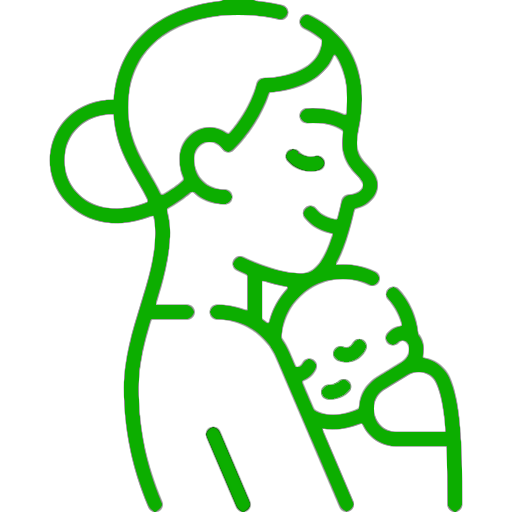Early indications and symptoms of pregnancy can include nausea and vomiting. If these symptoms are severe, they may suggest hyperemesis gravidarum, which is commonly described as a severe form of morning sickness and may necessitate medical care. Continue reading to learn more about this disease, including the distinctions between hyperemesis gravidarum and typical morning sickness, as well as how to treat it. You can also read about one mother’s firsthand experience with hyperemesis gravidarum and the treatments she got over the course of three pregnancies.

What Is Hyperemesis Gravidarum?
Hyperemesis gravidarum (HG) is a condition that causes severe nausea and vomiting during pregnancy. HG can cause dehydration, electrolyte imbalances, malnutrition, weight loss, and even death. HG affects about 1% of pregnant women, but only 0.5% of those affected experience symptoms severe enough to require hospitalization.
The exact cause of HG is unknown, but researchers believe that hormones play a role. In some cases, HG may be triggered by certain medications used to treat other conditions.
In fact, severe vomiting might cause you to lose more than 5% of your body weight. Severe weight loss, if left unchecked, might impact your baby’s birth weight and potentially lead to preterm birth. Nausea associated with hyperemesis gravidarum might linger for many hours each day and can have a significant impact on your everyday life. This problem necessitates medical attention to control the vomiting and restore the fluids you require to stay healthy.
Although up to 85% of pregnant women suffer some degree of morning sickness, hyperemesis gravidarum affects only about 3% of pregnant women. It commonly appears in early pregnancy, before nine weeks, and normally disappears throughout the second trimester. Do you know what week of pregnancy you’re in? To find out how far along you are, use our Due Date Calculator.
Symptoms of Hyperemesis Gravidarum
Dehydration
Common symptoms of hyperemesis gravidarum include nausea lasting more than a few hours per day, vomiting more than three times each day, and these symptoms interfering with your normal life.
The most prevalent element in our bodies is water. We are made up of roughly 60% water. We can become dehydrated if we do not drink enough water. We can grow bloated if we drink too much water. When we lose more water than we take in, we get dehydrated.
Dehydration happens when your body does not have enough water to function normally. Even mild dehydration can produce complications. Headaches, weariness, and dizziness can all be symptoms of dehydration. It can potentially result in more serious issues, such as heat stroke.
Dehydration is usually caused by not drinking enough fluids or by losing too much fluid. Fluid loss can be caused by sweating, vomiting, or diarrhea. You may also lose fluid when you breathe heavily in dry or cold air.
Dizziness
Dizziness is a feeling of lightheadedness, unsteadiness, or weakness. It can happen at any time of day but is often worse in the morning. Some people feel dizzy after standing up from sitting down. Other times, dizziness may come on suddenly without warning.Feeling lightheaded can also indicate hyperemesis gravidarum.
Weight loss
Weight loss during pregnancy can occur for several reasons. First, the mother may lose muscle mass due to hormonal fluctuations that affect protein synthesis. Second, the mother’s metabolic rate decreases during pregnancy, causing her to burn fewer calories. Third, the mother may experience nausea or vomiting, which leads to decreased food intake. Finally, some pregnant women experience excessive water retention, which increases their total body fluid content and results in weight gain.
Weight gain
Weight gain during pregnancy can be attributed to many factors including hormones, increased appetite, and changes in body composition. However, the primary cause of weight gain is due to the increase in fat mass. Fat stores are used to provide energy to the fetus and placenta. In addition, women tend to have higher levels of estrogen and progesterone, both of which stimulate lipolysis (the breakdown of fats). This causes the release of fatty acids into the bloodstream, which then get stored as fat.
Dental problems
1. Tooth decay
Tooth decay can occur at any time during pregnancy but is usually seen between the second trimester and third trimester. This is due to hormonal changes that cause increased salivary flow and decreased saliva’s ability to neutralize the acid. In addition, pregnant women are less likely to brush their teeth regularly.
2. Gum disease
Gum disease (gingivitis) is caused by bacteria that live in your mouth. Bacteria thrive in warm, moist environments like those found inside your mouth. When you’re pregnant, your body produces hormones that increase blood flow to certain areas, including your gums. This increases the number of bacteria in your mouth and makes it easier for them to multiply.
3. Periodontal disease
Periodontal disease occurs when plaque builds up around the gum line and causes inflammation. Plaque is a sticky film of food particles and bacteria that forms on your teeth. If not removed, plaque hardens into tartar. Tartar buildup can irritate the gums and lead to periodontal disease.
These are some of the warning signs that you should not overlook if you are pregnant. Contact your healthcare practitioner if you experience any of the symptoms listed above, or if you suspect you have hyperemesis gravidarum.
Hyperemesis Gravidarum vs. Morning Sickness
1. Hyperemesis gravidarum (HG) is a condition that occurs during pregnancy where women suffer from severe nausea and vomiting. HG affects about 1% of pregnant women worldwide. This condition can lead to dehydration, malnutrition, electrolyte imbalances, and even death if not treated properly.
2. Morning sickness is a common symptom experienced by many pregnant women. It usually begins around week 4-6 of gestation and lasts until the end of the first trimester. Symptoms include nausea, vomiting, fatigue, heartburn, diarrhea, constipation, headaches, dizziness, and abdominal pain.
Causes and Risk Factors
Hormonal changes during pregnancy, such as an increase in hCG and estrogen levels, can cause hyperemesis gravidarum. It might also be more likely to attack if you’re carrying twins or more. In rare situations, it could be caused by an underlying ailment such as thyroid or liver disease.
If your mother or sister had hyperemesis gravidarum during their pregnancies, you may as well, because this condition runs in families. Also, even if you don’t know what gender your kid is, hyperemesis gravidarum is more likely to occur if you’re having a girl.
Hyperemesis Gravidarum Prevention and Treatment
Unfortunately, there are no perfect methods for avoiding hyperemesis gravidarum. Depending on the severity of your symptoms and what your healthcare professional believes is best for your situation, treatment options may range from home remedies to hospitalization.
To battle nausea at home, your physician may first advise you to avoid odours and flavours that appear to provoke it. Other options that your provider may suggest are:
Following a bland diet of foods such as bananas, rice, or toast
Using a B6 vitamin supplement (alongside other prenatal vitamins)
Taking ginger tea
Wearing a wristband with pressure points. These wristbands deliver acupressure and are frequently used to alleviate motion or seasickness. Although these products have not been scientifically shown to cure nausea, many expectant mothers believe they do.
Depending on your condition, these home treatments may not be sufficient, and you may require additional medical therapy. If you’ve been losing a lot of weight or vomiting a lot, your doctor may admit you to the hospital, where treatment options may include:
Taking prescription drugs to help manage nausea and vomiting induced by hyperemesis gravidarum
1. Homeopathic Remedies
Homeopathy is a natural medicine that has been practiced for over 200 years. Homeopathy stimulates the body’s own healing systems by using highly diluted medicines. These medicines are free of adverse effects and are suitable for both mom and baby.
2. Acupuncture
Acupuncture is a technique that includes placing small needles into particular places on the skin. This treatment promotes the circulation of energy throughout the body. It helps to balance hormones and alleviate HG symptoms.
This page is based on professional advice from reputable medical and government organizations, such as the American Academy of Pediatrics and the American College of Obstetricians and Gynecologists. This page’s material should not be used in place of professional medical advice. For a complete diagnosis and treatment, always seek the advice of a medical expert.














Leave a Reply
View Comments